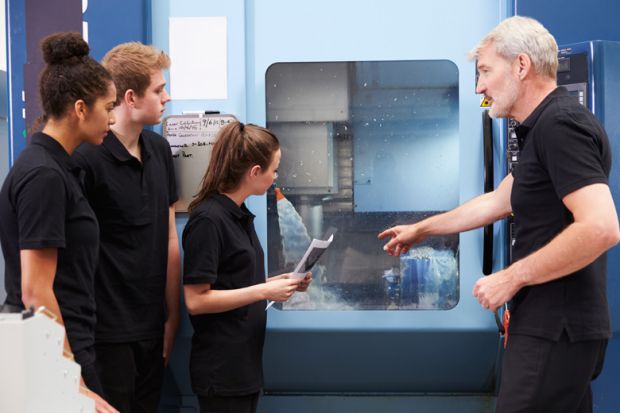They may be a relatively new player in the apprenticeships market, but degree apprenticeships have the potential for significant growth to contribute to the government’s ambitious target of 3 million apprenticeships by 2020. They are crucially helping to fill skills gaps and meet employers’ needs.
A report from Universities UK on the future growth of degree apprenticeships takes a look at the nascent programme of nine new industry-designed degree apprenticeships announced in March 2015.
These apprentices have full-time employment status, rather than student status, with the cost of the apprenticeship covered by the employer and the government and with no training costs or tuition fees incurred by the apprentice. The reaction to the scheme has been positive, with the Skills Funding Agency estimating between 1,500 and 2,000 starts for 2016 across 40 universities.
Combining a full degree with the real, practical skills gained in the workplace makes degree apprentices highly employable. They benefit from several years of workplace experience, alongside studying a course tailored specifically to employers’ needs.
So why is Universities UK taking a closer look at this programme? We believe – and we are being joined by an ever-growing group of ministers, businesses and universities – that degree apprenticeships have the potential to plug the skills gaps in local areas and to widen participation as an attractive option to non-traditional students.
At our report launch event at London South Bank University during National Apprenticeship Week 2016, I heard from apprentices and their employers about the benefits – on both sides – of being able to combine study with on-the-job experience. Views were overwhelmingly positive, as was the appetite for universities and business to identify further opportunities.
One apprentice, for example, mentioned that there was often little in the way of careers advice or awareness that it’s even possible to do an apprenticeship and get a degree out of it. Clearly that must change.
Another stressed the tangible benefits of their employer and university collaborating to design a course that would give them workplace skills along with the critical thinking and study skills gained from a university course. As one apprentice put it: “It doesn’t get a lot better than being able to gain crucial functional work experience in a full-time, paid job role whilst having a fully funded university degree programme.”
So what more can universities, businesses and the government do to develop the degree apprenticeships programme? Our report highlights a series of recommendations including:
- Universities need to understand what the demand for a degree apprenticeship looks like through national and local information on priority sectors, skills shortages and labour market trends
- Employers and universities then need to engage early on in the process, ensuring that everyone’s needs and requirements are fully understood. Employers are unlikely to make a major investment in a new programme unless it addresses their needs, while universities must be confident that they can meet such needs
- All sectors are desperate for more clarity on how the apprenticeship levy will work and the government must ensure that degree apprenticeships are an integral part of the digital voucher scheme at the outset.
Degree apprenticeships are a good news story for National Apprenticeships Week, and with further collaboration, support and clarity, we’ll see more and more young people getting the best of both worlds.
Nicola Dandridge is chief executive of Universities UK.
Register to continue
Why register?
- Registration is free and only takes a moment
- Once registered, you can read 3 articles a month
- Sign up for our newsletter
Subscribe
Or subscribe for unlimited access to:
- Unlimited access to news, views, insights & reviews
- Digital editions
- Digital access to THE’s university and college rankings analysis
Already registered or a current subscriber?



